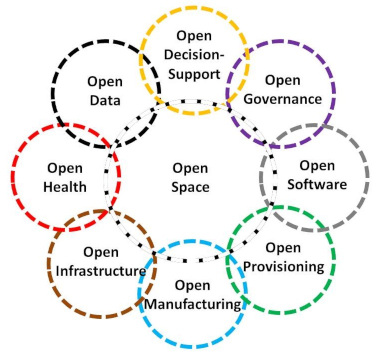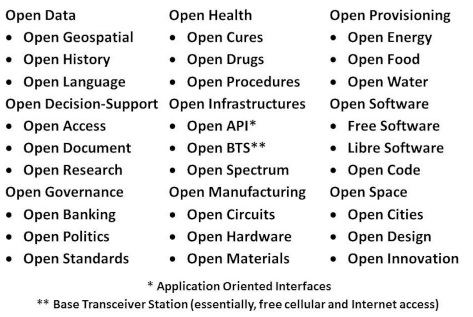Open Source Everything Engineering
Introduction by Robert Steele (written in 2015 and now largely outdated)
Intent
By agreement with the P2P Foundation, those of us coming together to foster improved cross-fertilization across the various opens will use the P2P Foundation Wiki to create pages and links so that a culture of Open Cooperativism is fostered in this neutral and nurturing environment. What we are finding is that extraordinary information intended to be shared is "lost" in discussion lists and internal web site postings.
Here is one short discussion: Open letter to OSHWA. Our recommendation is that information intended to be shared be wiki-fied first, and then the wiki URL shared so that others might be moved to augment, modify, and create.
History
Michel Bauwens, drawing on the extensive pioneering work of Mark Surman, David Eaves, and many others, previously created Category:Open where over 1,000 pages are connected. This new index respects the integrity of that prior work, and will build from it, but not create an encyclopedic text, only seek to assure that pages are created and linked as appropriate.
Overview
The term Open Source Ecology was popularized by Marcin Jakubowski, founder of the non-profit by the same name, and architect of the Global Village Construction Set. This term, while applying largely to the unified application of machines and materials to the intersection of energy, water, food, and shelter, can and should be applied to all nested groups of opens including those at the more developed intersection of communications, computing, digital transactions, education, and (self) governance.
The Term "open source everything" was popularized by the book The Open Source Everything Manifesto: Transparency, Truth, & Trust published in 2012 by North Atlantic Books, a New Age Publisher. It was not broadly noticed at the time. In 2014 Nafeez Ahmed, then a top journalist on ecology for wikipedia:The Guardian, wrote an article, The open source revolution is coming and it will conquer the 1% - ex CIA spy. 33,000 "likes" resulted in the first three days, and over time have climbed to 67,000 likes (as of 3 June 2015). Clearly a nerve has been touched, one that juxtaposes the pre-conditions of revolution and the urgent need to find affordable, inter-operable, scalable solutions to the challenges facing the 99% inclusive of the five billion poorest.
Related Big Ideas
The Circular Economy and its manifestation in the Open Source Circular Economy Days known to take place in at least 33 cities, is a distributed hackathon to kickstart a global grassrootes collaborative movement for a waste-free "cradle-to-cradle" circular economy as discussed at https://oscedays.org. OSCE and OSE share the view that a circular economy (and a radically open and free society with self-governance) are only possible through collaboration with transparency leveraging open everything starting with standards.
The Commons Transition at http://commonstransition.org is a database of practical experiences and policy proposals for a more human and environmentally grounded society. The existing and deeply embedded capitalist structure -- hierarchical and extractive in nature -- is rejected in favor of a more collaborative and distributed practice that is comprehensive in nature.
NOTE: To qualify as a "big idea" in this category one must be radically comprehensive. This excludes worthy but incremental ideas that do not challenge the entire system.
The Conference [Cancelled]
After discussion between Marcin Jakubowsky and Robert David Steele Vivas, and with the eventual concurrence of Michel Bauwens and rapid agreement by a number of world-class pioneers across multiple opens, the idea of a conference was born, on Open Source Everything for the 21st Century. There was insufficient interest across the 60 stovepipes. We also found no interest at all across the 60 opens in using the P2P Foundation Wiki as a commons.
Should a conferencce occur eventually, it's materials will be deposited here at the P2P Foundation wiki, in direct, constant, and evolving support to both Open Cooperativism and the Commons Transition. The conference home page, for the current year only, is http://ose-21.org. This web site is dormant for now.
Sub-Categories
With over 1,000 pages already rostered under the Category open, we see a need to agree upon and implement a sub-categorization scheme that will help group related personalities, projects, technologies, and goals. Below is a list of sub-categories as approved by Michel Bauwens after discussion among varied persons:
- Category: Open Data
- Open Decision-Support
- Category: Open Governance
- Open Health
- Open Infrastructures (see Category: P2P Infrastructures
- Open Manufacturing
- Open Provisioning
- Open Software
- Open Space
The many opens included in each of the above are discussed at the respective sub-category pages. Below is a table showing three examples for each of the sub-categories.
One useful next step would be the creation of a community directory of key people in each of the opens, key projects, key places, and then a persistent deliberate effort to cross-fertilize and connect across all boundaries.
Creating Ecologies of Cross-Fertilization
The view is put forward that stove-piped opens are a gift to the proprietary vendors and do not serve the public interest. Open Data or Open Government or Open Geo, for example, in the absence of Open Source Software, Open Hardware, and Open Spectrum, are not truly accessible to the public, not truly scalable, and not affordable to the larger public.
Individual persons (pioneers), projects, companies, and other implementation elements will be created as stubs and then linked in to their respective opens. We single out Richard Stallman for praise -- although he rejects the the term "open source" as we use it -- a culture, a mind-set, a method -- applicable to all forms of human endeavor, we hold him in the utmost regard as one of most accomplished pioneers in the Free/Libre/Open Source Software or FLOSS space, and embrace the moral and legal standards that he seeks to represent. His statement on why he rejects the term "open source" is here
It is our hope that individual pioneers and their fans will make this wiki the shared Open Space within which all new opens and all new elements of those opens can be announced, connected, respected, and shared.
CONTACT Robert David Steele Vivas if you would like to be a registered curator for a sub-category or a specific open.

